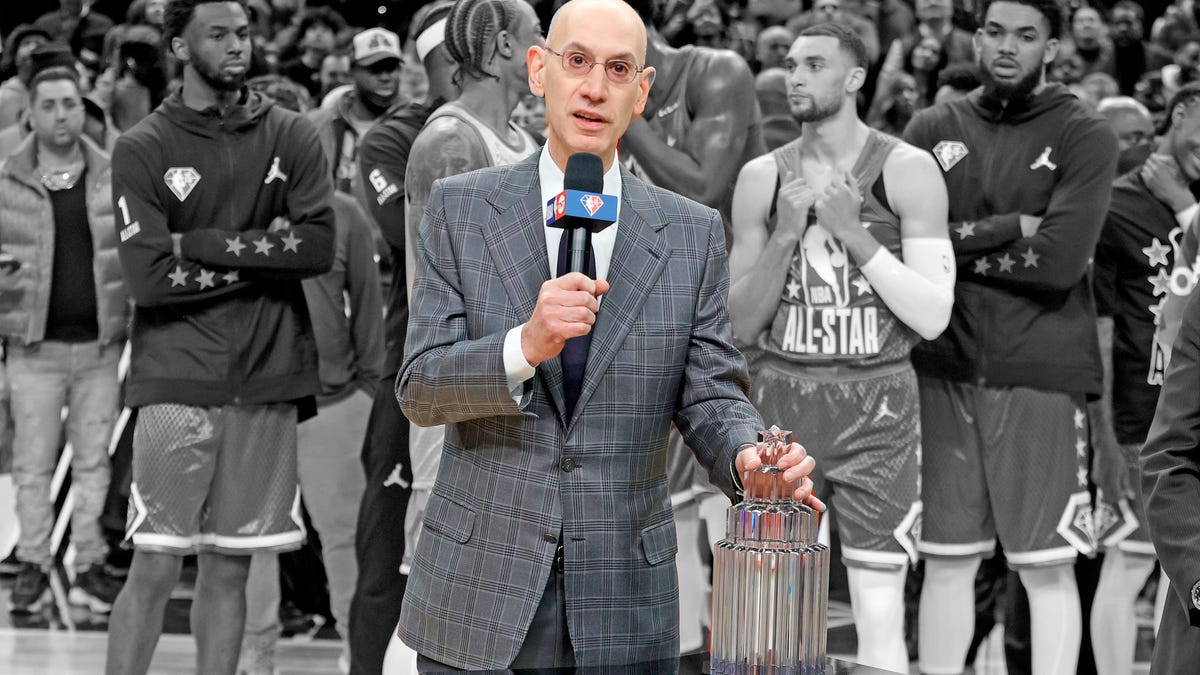Just shorten the season, Chumley

One of the headlines coming out of the NBA yesterday was Adam Silver’s lament that the league’s star players don’t actually dress for enough games during the regular season. This has been a grievance lodged by the media and fans for a while now, ever since the term “load management” entered the lexicon. At least before the jokes follow it.
It’s, of course, the NBA and its media’s fault. For one, 82 games has always been too many. Basketball doesn’t need to last until mid June, and even if it does, it’s really an absurd total. It only becomes more absurd the more and more emphasis we put on the playoffs and championships especially. From the moment a player enters the league, especially at the top of the draft, all he hears is that he’ll be evaluated by the number of rings he wears when his career is over. Ask LeBron how much that can wear on you. And when you push back, some retired player is always at the ready to tell any outlet just how much harder they had it and then flash their jewelry.
Owners have always emphasized the playoffs as well. TV contracts are weighted for them. Regular-season games are really something networks just put up with so they can get the rights to the playoffs. That’s true in all sports. It’s hard to get anyone to care about a Memphis-Denver game in February, and it’s even harder when the sport’s coverage and the league itself have been drilling into all fans that nothing matters until April.
So why would the most important players, whose next contract or endorsement or how they’re viewed by their own fans and what the stories about them all summer will be that all hinge on playoff results, power through a tight hamstring or hip that’s barking for all 82? Or even close to it? This is basketball, where, other than your own fans and your own comfort, home court doesn’t really matter. You don’t get the last at-bat or deal with weather you might not be comfortable with (hasn’t done much for the Packers though, has it?). Does it really matter if you finish as the first or third seed? Not really.
Look at the Warriors. They won 73 games in 2015-2016. They lost less than 10 games. It’s the most singular team accomplishment in the team’s history. It’s unlikely to be ever topped. And no one cares because they lost a coin flip to the greatest player to ever live. A team wins the Finals every year. Only one has ever won 73 games.
G/O Media may get a commission

43% Off
Flybird Adjustable Weight Bench
Gains
Can be adjusted with ease between seven back positions and three seat positions, has a weight capacity of 700 pounds, and is also quite comfortable too.
So what did everyone learn from that? Nothing you can do in the regular season, even things that have never been done before, counts unless you go the full way.
So what’s the answer? Shortening the season is the obvious one. Players will be more likely to play more often if they don’t have to pound through three games in four nights multiple times a season. Owners will keep more of their games around the weekends. Teams would be less forced to fly out of town right after a game and can rest in town more often (however they define “rest”). We went over all this when spouting how the NHL could lower to a perfect 76-game schedule in two ways and the benefits of it.
With only 30 teams, instead of 32, the NBA doesn’t quite fit into a 76-game model as well, but there’s a number they could find. Lessening the games makes the ones left matter just a bit more. This is the most reasonable answer, though some owners would need some convincing as they lose out on home dates. And players aren’t going to just give up 8-10 percent of their salary either.
A playoff restructuring would be another way to get there, along with shortening the season. Some sort of step-ladder system, where the higher the seed you get makes it easier to get to the Finals. Teams might not like having two or three weeks off, but if you want players to dress for all regular-season games they have to know that every game means something. If the reward is a simpler, and shorter, path to the Finals, that gets you there.
Though I might as well ask them to move the Finals to the moon.
This is love
I’ll sign off for the week with Dimitri Payet’s goal for Marseille yesterday:
You get only one or two volleys like this per season. A volley that looks not just like it was hit perfectly, but that the ball is streaking back to a lover it has been kept away from for months. There is not a straighter line and there’s a frenzy to its rush to the caress of the back of the net. The only other place you see this kind of meeting used to be the airport when you were allowed to meet people at the gate. This shot and the net are clearly drawn to each other.
For all the latest Sports News Click Here

